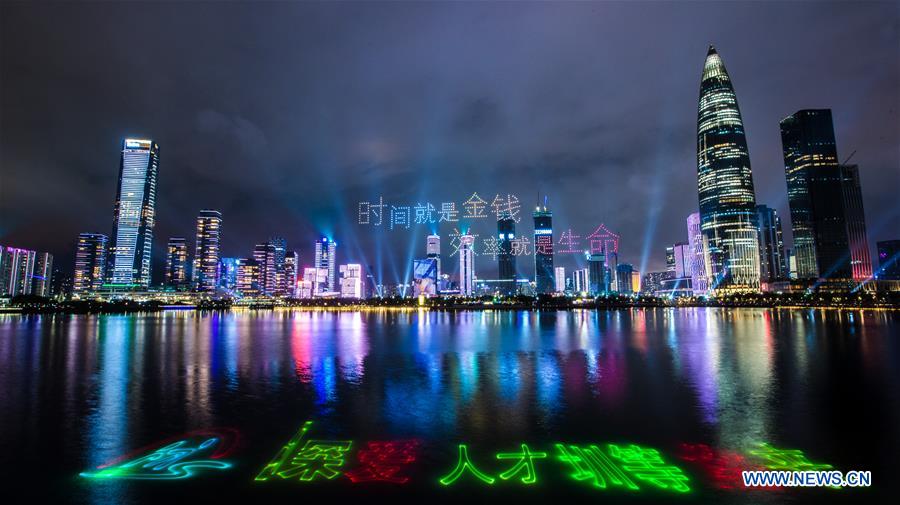Under Xi, miracle city Shenzhen prospers in new era of reform


GUANGZHOU -- In just over 40 years, Shenzhen in South China has transformed itself from a small fishing village into a global economic powerhouse.
Behind Shenzhen's miraculous rise was the establishment of the Shenzhen Special Economic Zone (SEZ).
This year marks the 40th anniversary of the SEZ. The city, a trademark for China's reform and opening up, is once again embracing opportunities brought by the new era to strive for a hub of innovation, entrepreneurship, and creativity with international influences.
XI'S TWO VISITS
Chinese leader Xi Jinping visited Shenzhen twice after assuming the post of the general secretary of the Communist Party of China (CPC) Central Committee in 2012.
In December 2012, Xi chose Shenzhen to be the first stop of his inspection trips after the 18th CPC National Congress.
During that trip, Xi said reform and opening up is the source of vitality in the development of modern China, and "a magic tool" for the Party and the Chinese people to keep pace with the times.
In October 2018, Xi visited Shenzhen again when the country was celebrating the 40th anniversary of its reform and opening up.
This time, he urged Shenzhen to deepen cooperation with its neighbor Hong Kong to play a bigger role in building the Belt and Road, advancing the development of the Guangdong-Hong Kong-Macao Greater Bay Area, and participating in international cooperation at higher levels.
Xi also said he made the two trips to tell the world that China will not stop its pursuit of reform and opening up -- not for one moment, and China will certainly deliver a bigger miracle that will draw worldwide attention.
REFORM IN A NEW ERA
With reforms and opening up as its basis, Shenzhen in 2013 spearheaded reforms in the business sector to streamline registrations and facilitate innovation and start-ups.
Last year, the city took the lead in shortening the time for enterprise registration from one day to only dozens of seconds.
By the end of June this year, the number of business entities in Shenzhen stood at 3.39 million, with small- and medium-sized enterprises accounting for 63.4 percent of the total.
Shenzhen has also embraced great new opportunities as the country established the China (Guangdong) Pilot Free Trade Zone at the end of 2014. The FTZ includes Shenzhen's Qianhai and Shekou.
In the first seven months of this year, the Qianhai and Shekou FTZ area saw its foreign trade up by 20.8 percent year on year to approach 109 billion yuan (about $15.8 billion).
The city continues to optimize its business environment with further reforms in key areas such as business registration, administrative approval, tax payment, cross-border trade, and intellectual property rights protection and application this year.
AIMING FOR NEW HEIGHTS
After Xi's 2018 visit, China issued the Outline Development Plan for the Guangdong-Hong Kong-Macao Greater Bay Area, and guidelines to build Shenzhen into a pilot demonstration area of socialism with Chinese characteristics.
Shenzhen is expected to become a national model of high-quality development, as well as a hub of innovation, entrepreneurship, and creativity with international influences by 2035, according to the guidelines.
Business people said these will provide ample space for Shenzhen's development, and accelerate regional integration.
When it comes to talking business in Shenzhen, "there's not so many twists and turns here, and it's highly efficient," said Wang Yongkun, founder of Standard Robots (Shenzhen) Co Ltd.
In 2020, Shenzhen houses eight Fortune 500 companies, including Huawei, Tencent, and China Merchants Bank.
The city's GDP reached 2.69 trillion yuan in 2019. Its state-level high-tech companies increased by 2,700 last year.
The city has 8.5 national high-tech companies on every square km of area and 71 invention patents granted each day on average.
"Shenzhen's development has benefited from losing no time in promoting reform in all areas. The more complex and severe the external environment is, the more we need to comprehensively deepen reform," said Wu Sikang, director of the Development Research Center of the Shenzhen municipal government.
At a symposium on economic and social work this week, Xi reiterated that opening up is a fundamental national policy. He stressed the need to raise the level of opening up in an all-round way, build higher-level new institutions of the open economy, and form new advantages in international cooperation and competition.
Li Luoli, vice-chairman of the China Development Institute, based in Shenzhen, said under these new circumstances Shenzhen should create an even better policy, financial, legal, and integrity-based environment for enterprises, and continue to play a leading role in China's reform and opening up.
- Beijing courts boost efforts to resolve livelihood-related cases
- Reminder tips from Weifang police spark buzz on Xiaohongshu
- Former head of national tobacco body stands trial on bribery charges
- China warns DPP's attempt to seek 'Taiwan independence' will be futile
- Consistent progress seen in environmental protection
- Former head of China's State Tobacco Monopoly stands trial for graft, abuse of power





































